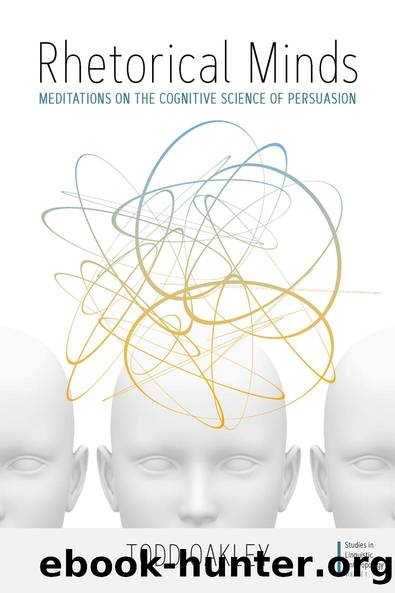Rhetorical Minds by Todd Oakley

Author:Todd Oakley [Oakley, Todd]
Language: eng
Format: epub
Tags: Nonfiction, Reference & Language, Language Arts, Public Speaking, Rhetoric, Social & Cultural Studies, Social Science, Anthropology, Sociology
ISBN: 9781789206708
Publisher: Berghahn Books
Published: 2020-04-09T04:00:00+00:00
Transcendental Intersubjectivity
Let us pause momentarily for a brief foray into Husserlâs phenomenology. Husserlâs âFifth Mediationâ (1977: 89â150) offers a transcendental analysis of our experience with others, for it is assumed to be universally valid for the structure of interpersonal experience. Husserl takes as his point of departure a notion that there is a primary non-intersubjective experience that differentiates oneâs body and external things. Thus, one needs empathy to have true intersubjective experiences. One can ascribe âhyleticâ experiences (e.g., tactile sensations) only to oneâs own body. While it is true that we come to ascribe such experiences to our bodies, the story of development provided above and below suggests that Husserlâs first analysis assumes too much. Of course, these are first-person characteristics of experience that become increasingly important as bodily autonomy increases, but it is unlikely the fact that these primordial experiences can be separated from the infant-caregiver dyad. It makes more sense to suggest that the initial hyletic experiences are inter-corporeal before being âinternalizedâ regarding a self who actively empathizes with others.
Husserl is on firmer ground in his second observation. Perception and experience of the other are based on apperception. Little Abe can never see all sides of Nancy or Thomas at once, even as he experiences each of them as whole persons, not just as faces, or eyes, or teeth, or arms. The whole person, then, is appresented, not only for her or his own body but concerning her or his own experiences. Mommy is beloved-mommy because Abe experiences her as a person; father is stern-father for the same reason, and so on. But, in contrast to primordial intrauterine- and neonate-Abeâs experiences, where self and other are experiences as a synchronized corporal unit, autonomous Abe develops a more empathic experience of others, such that the first-person experiences are now decidedly second-person experiences. Abeâs experiences are decidedly asynchronous and asymmetrical with his closest companions. Nancy has to empathize with toddler Abeâs teething pains, but in contrast to their more synchronized discomfort in utero, such sympathies are appresented (perhaps so acutely that Nancy is genuinely pained at the sight of her son in pain). This is, nonetheless, a decidedly second- and not first-person phenomenon. Still, such engagements, being so intimate, do not require inference. That is, Nancy does not need to bring extra-perceptual cognitive processes to bear to discover that Abe is in pain.
Download
This site does not store any files on its server. We only index and link to content provided by other sites. Please contact the content providers to delete copyright contents if any and email us, we'll remove relevant links or contents immediately.
| Administration & Medicine Economics | Allied Health Professions |
| Basic Sciences | Dentistry |
| History | Medical Informatics |
| Medicine | Nursing |
| Pharmacology | Psychology |
| Research | Veterinary Medicine |
Machine Learning at Scale with H2O by Gregory Keys | David Whiting(2320)
Fairy Tale by Stephen King(2092)
Will by Will Smith(2064)
Hooked: A Dark, Contemporary Romance (Never After Series) by Emily McIntire(1998)
Rationality by Steven Pinker(1773)
Friends, Lovers, and the Big Terrible Thing by Matthew Perry(1344)
The Becoming by Nora Roberts(1339)
A Short History of War by Jeremy Black(1305)
The Strength In Our Scars by Bianca Sparacino(1278)
HBR's 10 Must Reads 2022 by Harvard Business Review(1261)
515945210 by Unknown(1216)
Fear No Evil by James Patterson(1117)
Love on the Brain by Ali Hazelwood(1117)
Bewilderment by Richard Powers(1089)
443319537 by Unknown(1079)
The Real Anthony Fauci: Bill Gates, Big Pharma, and the Global War on Democracy and Public Health (Childrenâs Health Defense) by Robert F. Kennedy(1070)
The Psychiatric-Mental Health Nurse Practitioner Certification Review Manual by Zakhari Raymond DNP EdM ANP-BC FNP-BC PMHNP-BC;(1049)
Leviathan Falls (The Expanse Book 9) by James S. A. Corey(1040)
Works by Richard Wright(1023)
